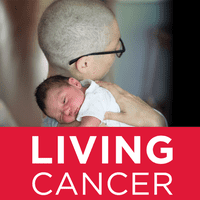When Your Cancer Doctor Gives You ‘12 Months to Live,’ Here’s What That Really Means
Tuesday, February 10, 2015
Play
00:00 / 00:00
 For oncologists, figuring out how much time a cancer patient has left can be challenging. (Illustration by Anna Parini)
For oncologists, figuring out how much time a cancer patient has left can be challenging. (Illustration by Anna Parini)
(The SOUND in the room is normal. No more SLOW-MOTION. Walt looks up from the man's lapel.)
DOCTOR: Mr. White. Mr. White?
WALT: Yes.
DOCTOR: You've understood what I've just said to you?
WALT: Yes. Lung cancer. Inoperable.
DOCTOR: I'm sorry, I just need to make sure you fully understand.
WALT: Best-case scenario, with chemo, I'll live maybe another couple of years. (Off the man's gaze.) It's just, you've got mustard on your... (He points to his lapel.) You've got mustard there. Right there.
- Breaking Bad pilot
It’s a cliché… a patient is diagnosed with cancer and told they have ‘x months left to live.’ And if that person lives less than that amount of time, they feel as though they have been cheated or mislead. If they live longer than their prognosis, they doubt their doctor or feel they are living on borrowed time.
Dr. Tomer Levin, a psychiatrist at Memorial Sloan Kettering Cancer Center in New York, believes that the problem lies in a breakdown in communication between doctor and patient.
“These prognostic conversations drive patients and their families crazy,” he explains. “Because it's hard to understand the stats. It really is.”
To improve patients’ understanding of their prognosis, Levin helps run Comskil, communication skills workshops at Memorial Sloan Kettering to guide cancer doctors and caregivers on how to deliver a prognosis effectively and empathically. Here's what he thinks patients need to know:
- A cancer prognosis is not an absolute number. An oncologist typically gives the number as a median, but Levin says that patients often understand it to be an absolute number. “A 12-month median survival means that in 12 months time half of all similar patients will be alive, and half will have died.” It is not as though there is an exact date on which that patient will expire. Some people will do worse than their prognosis, and some will do much better.
- Cancer patients retain less than half of what their oncologists tell them. "If a person is very anxious," Dr. Levin said. "They may hear 'cancer' and everything else becomes blah blah blah.” Studies show that anxiety makes it difficult to remember information. To help address this problem, Levin counsels doctors to write down prognostic information, to repeat important details, and to explain the numbers in a manner that patients will understand.
- Studies show that when doctors make a personal connection with a patient, they tend to be overly optimistic. Studies show that when doctors make a personal connection with a patient, they tend to be overly optimistic. But Levin argues that being overly optimistic can prevent patients from preparing for their worst. Prognostication is intended to assist the patient with planning, and Levin counsels doctors to talk about death and dying openly, and to assure patients that they will not abandon them if their cancer worsens.
- One in ten patients do MUCH better than the median survival for their cancer. Let's say 10 patients are given a 1-year median survival; 1 of those patients will actually live for 3 to 4 years. And survival is calculated looking at the past experience of patients with the same kind of cancer, not taking into account new treatments. As better drugs and treatment regimens are developed, a patient’s prognosis might change.
Our series is produced with WETA, whose documentary Ken Burns Presents Cancer: The Emperor of All Maladies will air on PBS in March.




